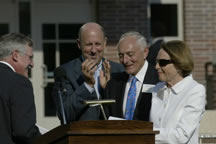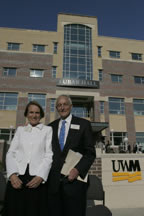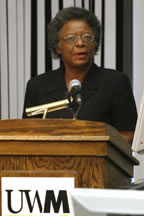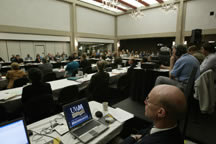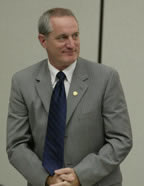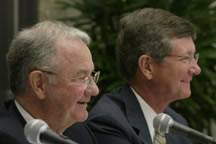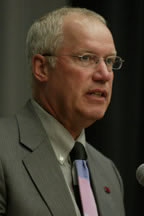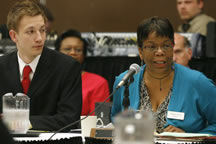MILWAUKEE-The University of Wisconsin-Milwaukee earned praise from the UW System Board of Regents on Friday (June 9) for a serious-minded growth agenda for the campus that will mark the campus and the city of Milwaukee as crucial elements in Wisconsin’s future development.
“UW-Milwaukee is looking forward to an exciting and vibrant research agenda that is second to none,” said Regent Chuck Pruitt of Shorewood.
The Regents thanked Chancellor Carlos Santiago and his colleagues from UW-Milwaukee for hosting the Board’s annual meeting on the campus and providing a comprehensive look at where Wisconsin’s urban university is headed.
On Thursday evening, in recognition of Sheldon B. Lubar’s commitment to UW-Milwaukee and the UW System, the former School of Business Administration was formally dedicated as the Sheldon B. Lubar School of Business. At the same ceremony, the School of Business Administration building was formally christened Lubar Hall.
UWM Chancellor Carlos E. Santiago; V. Kanti Prasad, dean of the Lubar School of Business; David G. Walsh, president of the Board of Regents; State Rep. Curt Gielow, former chair of the UWM Foundation; and Wisconsin Gov. Jim Doyle honored Lubar and his wife, Marianne, at the outdoor ceremony.
Approximately 300 invited guests were treated to a performance by the Fine Arts Quartet of UWM’s Peck School of the Arts, and a dramatic sign-unveiling by three UWM business students.
The Board of Regents approved the renaming of the UWM School of Business Administration to the Sheldon B. Lubar School of Business at its April 7 meeting.
The UWM administration requested the name change on Feb. 6, when a gift of $10 million from Lubar was announced. The gift, earmarked for the UWM business school, is the largest single donation in the university’s 49-year history. The new resources will be used to advance the school’s mission in a variety of ways, including funding for new professorships and student scholarships.
Lubar, a prominent Milwaukee business leader and philanthropist, is chairman of Lubar & Company, Inc. He has been an active member of the School of Business Advisory Council for more than 30 years, Distinguished Director of the UWM Foundation, member of the UWM Peck School of the Arts Advisory Council, supporter of business students through the Lubar Scholars program and funder of the Sheldon Lubar Chair of Free Enterprise. In 1988, he was recognized by UWM with an honorary doctoral degree in Commercial Science.
Lubar’s distinguished career of public service has included his work for three U.S. presidents. He also has served the State of Wisconsin in various capacities, including president of the UW System Board of Regents and a trustee of the Investment Board.
In addition to his personal gift of $10 million, Lubar plans to help the university raise an additional $20 million for the business school. Lubar also is serving as honorary co-chair for the UWM comprehensive campaign. The goal of this fund-raising campaign is $100 million.
“At the end of the day, this is all about the students enrolled today and who will be enrolled tomorrow. We encourage others to join us in this effort,” Lubar said. “What greater good can a citizen perform than to extend a helping hand to those who will follow?”
Santiago describes the $10 million gift as a “phenomenal commitment from someone who has devoted much of his life advancing higher education in Wisconsin. Our university’s dual missions of access and research will receive unparalleled support by way of this contribution. I am very appreciative to the Lubar family for supporting UWM in its mission to build our research capabilities and transfer our knowledge to the businesses that will make regional economic expansion possible.”
“The gift from the Lubars has inspired and energized our students, faculty, staff and alumni,” said Prasad. “This breakthrough endowment will enhance student and faculty excellence, allow us to continue building ‘steeples of excellence’ among our faculty and forge corporate linkages. We are proud and honored to be named after this generous and visionary man on the eve of the business school’s 40th anniversary.”
Gielow read a citation from the State Senate on behalf of State Sen. Alberta Darling. Santiago also read a Certificate of Special Recognition from U.S. Sen. Russ Feingold.
Walsh cited Lubar for helping to bring corporate leaders together in support of UWM, and for “everything you’ve done for the university system.”
Doyle focused attention on the importance of UWM, which educates more Wisconsin residents than any other institution in the state. He described Lubar as one of Wisconsin’s greatest representatives in the business community, and someone who “stands for the very highest in business ethnics.” The governor cited Lubar as not only a highly successful business person, but also one who should be emulated. “We pay tribute to the leadership you have brought to Wisconsin education, and your generosity and kindness.”
Santiago then called on three Lubar Scholars – Zachary Orr, Elicia Scaife and G. Thao – to pull down a banner covering the new Lubar Hall sign. The event concluded with a reception in the east courtyard of Lubar Hall.
The Sheldon B. Lubar School of Business is a major metropolitan business school dedicated to academic excellence and committed to providing a high-quality educational experience. Its curriculum links academic content, current business models and state-of-the-art technologies in all classrooms. Its full-time professors and instructional staff are recognized for excellence in teaching, research and service, and instruct in more than 20 graduate and undergraduate programs. Its prime urban location offers students unique access to the industrial, technological and commercial energy of Southeastern Wisconsin, and allows them to pursue a wide variety of employment and internship opportunities. The school has been accredited by AACSB-International, the Association to Advance Collegiate Schools of Business, for more than 30 years. Current enrollment at the school, which is the second-largest degree-granting institution on campus, is 4,400 students.
–Beth Stafford
Student success drives UW admissions policy
A review of admissions policies and practices in the UW System is intended to help the university better align its commitments to furthering student success and providing a diverse learning environment with new legal requirements, Regents learned Friday.
“We’ll always have a place in this system for kids who study hard, get good grades, and come to us prepared academically for the success we hope they’ll attain,” said UW System President Kevin P. Reilly.
Through a process known as “holistic admissions,” UW admissions officers can be sure to take into account all factors that may determine whether a student will have success at a UW campus, said Cora Marrett, UW System Senior Vice President for Academic Affairs.
“Note that these include academic standards, but they incorporate nonacademic achievements as well,” Marrett said, adding that similar standards are also used in a state program to recognize outstanding students at the high-school level.
A holistic review, she said, takes into account an applicant’s test scores, class rank, and grade-point average, but also extracurricular activities, personal background, leadership, and aspirations, often as students express them in a personal statement. This kind of review gives admissions officers a “broad understanding” of a student in order to determine whether they are likely to have success as a UW student.
UW campuses are reviewing how they go about admitting students to ensure compliance with recent decisions by the U.S. Supreme Court, said UW System General Counsel Pat Brady. The court ruled in cases related to the University of Michigan that universities may consider race or ethnicity as one factor among many when evaluating student applicants. The review process, however, must be holistic, or individualized and nonmechanical.
“The cases really supported what had been the policies of this Board,” Brady said. She added that admissions officers are continuing to ensure that campuses conduct a nonmechanical review, as advised by the Court, and will report to the Board in Fall. A UW committee that issued recommendations to campuses about how to conduct these reviews may also recommend that the Board revise its admissions policy.
But Regent President Walsh reiterated that the current admissions policy, as set by the Board, has not yet changed as part of this review.
Walsh reviewed for the Board the Regents policy on admissions, which he said has evolved since its creation in 1972, and was last updated in 2001. Walsh said the policy provides that the system accommodate the diverse needs of Wisconsin’s population through a flexible admissions policy.
Institutions are responsible for developing their own policies, he said, and students lacking some academic qualifications can be considered, if, on the basis of other factors, they appear to have a reasonable probability of success.
“Our policy was consistent with the Michigan decision,” Walsh summarized. “Contrary to what some have claimed this policy is doing, the UW System has not changed its admissions policy. And we want families in Wisconsin to know that grades, and rank, and performance in school will continue to be primary.”
But, Walsh added, the evidence is clear that grades alone do not determine whether a student will have success in college. “We will continue to look at grades, and we will continue to look at the whole person,” Walsh said.
Student Regent Chris Semenas read a statement on behalf of Regent Milt McPike, who strongly supports the holistic admissions approach.
“I believe deeply in the promise of access and opportunity that the UW System, as one of Wisconsin’s premier public higher education systems, offers to its citizens,” McPike wrote. “And I believe deeply that all students – of whatever background or race – benefit from more diverse educational settings.”
The post-collegiate world, Marrett said, demands that UW graduates can connect ideas and communicate them, and link those ideas in diverse settings.
“We’ve heard consistently that we need to do a better job of preparing students for a diverse world,” Reilly agreed. “We want to be responsive as a university system to that advice.”
Regent Judy Crain of Green Bay said it is clear that there are differences in how campuses conduct their admissions practices. For example, some campuses may have established different criteria for admission than others, she noted.
But it is “absolutely essential” to let students and their families know that qualified students will always have a place in the UW System, Crain said.
“We are not a private system,” Crain said. “I think our citizens need to know that.”
Walsh also reiterated the Board’s commitment to providing a diverse student body for the benefit of all students. He said campuses will continue to review their admissions practices, and will revise them where appropriate to align with the law, but that the Board would be responsible for making any changes to UW System policy on admissions.
“We’re not there yet,” Walsh said. He added that once campuses have completed their internal discussions on admissions this fall, the Board will likely discuss the impacts of those conversations in December.
Regents take action on disciplinary process
The Board approved a resolution on Friday to set in motion a process that will allow the Board to follow an expedited disciplinary process to if employees engage in serious criminal misconduct that poses a risk to the university community.
“This represents our best thinking at this time about how we should move forward,” said Regent Michael Spector, who has been leading a Regents’ committee on the matter.
The process to make the policy official will include a public hearing, which could be held this summer, as well as opportunities for legislative organizations and governance groups to offer further suggestions.
“We think it’s important that the faculty now see this final product,” Spector said. “There’s going to be some opportunities for change.”
Regents noted that the current proposed policy is very responsive to the concerns that faculty governance groups had raised.
Regent Jeffrey Bartell of Madison said part of the proposed policy that specifically exempts expression protected by academic freedom may not be needed because constitutionally protected conduct cannot be criminalized, but Walsh said the policy is intended to outline the timing and requirements the Board must follow in managing instances of serious criminal misconduct that pose a risk to the university community. Academic freedom is important to the university and this policy is not intended to suppress any expression in that spirit, Walsh said.
“It is very, very important to have something to send a signal to faculty that this is not about a witch hunt by Regents,” added President Reilly. “This is about having an expedited process.”
The Board will consider the policy again in Fall.
In committee news, Business, Finance, and Audit Committee Chair Regent Chuck Pruitt of Shorewood told the Board that the UW System has filed a formal request with the Joint Finance Committee to be allowed to apply any utility savings at the end of the year toward costs of a state program to provide tuition remissions to qualified veterans.
Regent Jesus Salas of Milwaukee, chair of the Physical Planning and Funding Committee, said the committee had a set a goal for a renovation project at Camp Randall Stadium at UW-Madison to include 10 percent participation by minority-owned businesses, but participation was only 3.67 percent. Salas said the committee will soon address accountability for meeting this goal in future projects. Also, he said, the specifics of capital projects that use student segregated fees will be clearly outlined for Regent review.
Reilly presents good news to Regents
Regents celebrated many recent accomplishments of UW System institutions on Friday as part of President’s Reilly “good news” report to the Board. Highlights included:
- A $1 million donation to UW-Superior’s “Campaign Superior: Higher Expectations” campaign by Retired Colonel John Bremer, a UW-Superior alumnus, and his wife, Aurie.
- Solutions for Our Future, a national campaign run by the American Council on Education, recognized UW-Oshkosh for its efforts to promote the importance of a liberal arts and sciences education.
- UW Colleges earned recognition for its participation in the Foundations of Excellence in the First College Year program, which aims to improve the first-year experience for college students.
- UW-Madison and Nicolet College in Rhinelander, Wis. Signed a transfer contract that will allow qualified students to transfer from the latter to the former as upperclassmen.
- UW-Platteville’s International Business Resource Center received the 2006 Governor’s Export Achievement Award for its work to increase contact with business and governments in China and to learn how the state and the U.S. might participate in the markets of North Africa.
- UW-Richland hosted Faculty College 2006, where more than 100 UW System faculty strengthened their skills to improve undergraduate teaching and learning.
- The National Science Foundation granted $84,000 to UW-River Falls to create a course in astrophysics.
- President Reilly welcomed new UW-Eau Claire Chancellor Brian Levin-Stankevich, who attended his first Board of Regents meeting.
- Finally, President Reilly honored Michael Falk, a UW-Milwaukee researcher, for his winning $250,000 in the final round of the “Jeopardy! Tournament of Champions.”
Board re-elects Walsh, Bradley to leadership roles
Regents voted unanimously Friday to re-elect David Walsh of Madison as President and Mark Bradley of Wausau as Vice President for a second consecutive term.
Walsh has served as president of the Board of Regents since June 2005. He began his service as a Regent in 2003 and previously served as vice president of the Board.
“We have been extremely fortunate, in my judgment, to have David Walsh leading us through the difficult times [we have faced this year],” said Regent Pruitt in nominating Walsh for a second term. He said Walsh will be an able leader as the Board confronts new challenges and the next biennial budget.
“I do thank you for the confidence,” Walsh said in accepting the post.
Regent Crain nominated Regent Mark Bradley for re-election as vice president, saying that he has been a strong part of the Board’s exemplary leadership.
Bradley said he was willing to serve and pledged his time to the post.
“The most important thing we’ve got in front of us is to continue to make the case to the public and their elected officials that for the social and economic challenges that face this state, higher education is one of the most important solutions we have,” Bradley said.
Bradley has served as chair of the Business, Finance and Audit Committee, and as a member of the Executive Committee and the Special Regent Committee for the UW Colleges and UW-Extension Chancellor Search. He is also the Regent representative on the Research Park Board.
Both President Walsh and Vice President Bradley will serve in their roles as officers until June 2007.
The board on Friday also unanimously re-elected several other board officers, including Board Secretary Judith A. Temby, Assistant Board Secretary Cheryle Goplin, Trust Officer Deborah Durcan, and Assistant Trust Officers Patricia Brady and Douglas Hoerr. All board officers will serve one-year terms.
Also on Friday, the Board of Regents on Friday thanked outgoing UW-La Crosse Chancellor Doug Hastad for his many years of leadership at that campus. Regent Brent Smith of La Crosse presented Chancellor Hastad with a plaque and medal to commemorate his service, saying the outgoing chancellor encouraged ties between the campus and its surrounding city.
“The faculty and students will miss his leadership and his accessibility,” Smith said.
Hastad, who is leaving UW-La Crosse to become president of Carroll College in Waukesha, offered Regents a number of suggestions as the UW System continues to further its mission. He particularly noted that the UW System must continue to focus on providing a quality education as it also seeks to increase student access. Hastad also encouraged Board and UW System leadership to allow campuses more autonomy, but also to hold them accountable for meeting their goals.
“The UW System means a great deal to me,” he said. “It means even more to the state of Wisconsin.”
Also on Friday, the Board affirmed the commitment of the University of Wisconsin School of Medicine and Public Health to training its students to provide services to diverse populations. The resolution, which passed by a vote of 13-1, stemmed from concerns raised at Thursday’s meeting regarding an agreement between the university and Aurora Health Care.
“We are at least being heard about a concern we have [with the agreement],” Regent Danae Davis said in support of the resolution.
In other business, the Board of Regents cancelled its July and September meetings, extended its August meeting to two days (17-18) and planned to add an additional one-day meeting in early August, the date of which will be announced later, to discuss the 2006-07 operating budget. The Board also unanimously approved its 2007 meeting schedule. The Regents also approved resolutions to:
- Authorize a B.S. in Information and Communications Technologies at UW-Stout; a bachelor’s degree program in Fire and Emergency Response Management at UW-Oshkosh; and an M.S. in Nonprofit Management and Leadership at UW-Milwaukee;
- Approve revised Faculty Personnel Rules at UW-River Falls;
- Accept the report on Promotions, Tenure Designations, and Related Academic Approval Items.
- Acknowledge and thank those who left bequests to UW System institutions of $50,000 or more;
- Grant approval of the design report and authorize a budget increase for a University Union expansion and remodeling project at UW-Green Bay;
- Transfer land from UW-Madison known as the Ashland Agriculture Research Station to Ashland and Bayfield Counties;
- Adjust the UW-Stout campus boundary to allow for future land acquisition; and
- Approve the design report and adjust the project scope and budget and construct the College of Business and Economics Building at UW-Whitewater.
In closed session, Regents approved 2006-07 pay plan adjustments for academic leaders. Following the state-approved pay plan for faculty and other unclassified staff, Regents approved distribution of an average 4.3 percent pay-plan increase for chancellors, senior academic leaders, provosts, and the UW System President.
Such compensation is distributed among university employees for solid and meritorious performance, to recognize market factors, and to meet other needs, such as salary compression.
Regents also considered pay plan adjustments for university employees whose salaries are set at a level that exceeds 75 percent of the salary for the UW System President.
–UW-Milwaukee photographers Peter Jakubowski and Alan Magayne-Roshak contributed to this report.
###
The UW System Board of Regents will hold its next meeting in August 2006.
Related: Read June 8 (day 1) news summary

